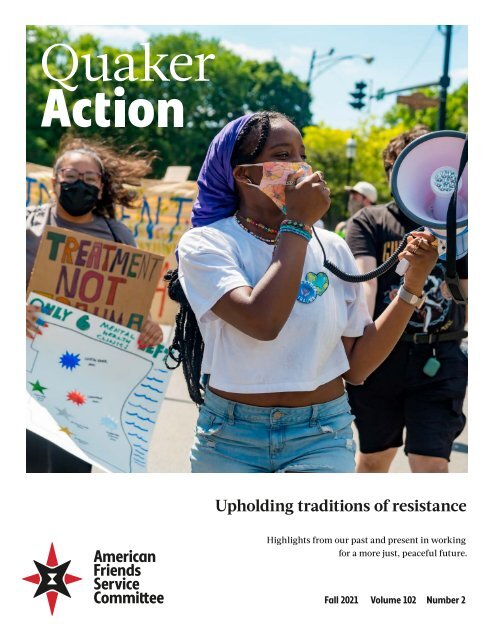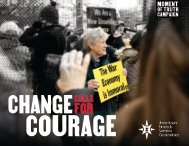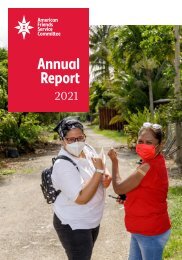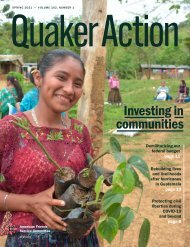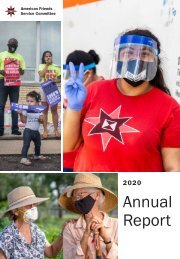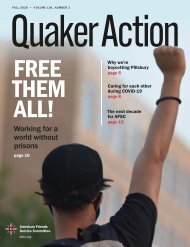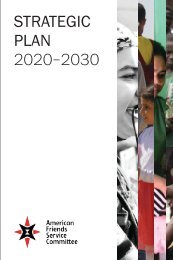Quaker Action: Upholding traditions of resistance (Fall 2021)
Welcome to the newly redesigned Quaker Action! We hope you enjoy it. These changes are part of our larger effort to make our worldwide work more accessible and recognizable—while carrying forward the same values and commitment of those who came before. Learn more about these changes. In this issue, you'll read updates on AFSC’s recent successes as well as highlights from our past. We hope you enjoy exploring how different AFSC generations have boldly risen in historic moments, transforming our society for the better.
Welcome to the newly redesigned Quaker Action! We hope you enjoy it.
These changes are part of our larger effort to make our worldwide work more accessible and recognizable—while carrying forward the same values and commitment of those who came before. Learn more about these changes.
In this issue, you'll read updates on AFSC’s recent successes as well as highlights from our past. We hope you enjoy exploring how different AFSC generations have boldly risen in historic moments, transforming our society for the better.
Create successful ePaper yourself
Turn your PDF publications into a flip-book with our unique Google optimized e-Paper software.
<strong>Upholding</strong> <strong>traditions</strong> <strong>of</strong> <strong>resistance</strong><br />
Highlights from our past and present in working<br />
for a more just, peaceful future.<br />
<strong>Fall</strong> <strong>2021</strong> Volume 102 Number 2
In the 1950s, AFSC supported Black families and<br />
Contents<br />
organizations afer Prince Edward County, Virginia<br />
refused to desegregate its public schools. See page 8.<br />
PHOTO: AFSC ARCHIVES<br />
Published by the<br />
American Friends<br />
Service Committee<br />
Who we are<br />
The American Friends Service Committee<br />
(AFSC) promotes a world free <strong>of</strong> violence,<br />
inequality, and oppression.<br />
Guided by the <strong>Quaker</strong> belief in the divine<br />
light within each person, we nurture<br />
the seeds <strong>of</strong> change and the respect for<br />
human life to fundamentally transform<br />
our societies and institutions.<br />
8<br />
Managing Editor<br />
Ronna Bolante<br />
CONTENTS<br />
2 Leter from our general secretary<br />
3 Alumni news<br />
4 Updates from AFSC<br />
6 Q+A: Unifying Palestinian youth across divides<br />
An interview with Ali Abdalbari, AFSC’s Gaza program coordinator.<br />
SPECIAL FEATURE<br />
7 Then and now: <strong>Upholding</strong> <strong>traditions</strong> <strong>of</strong> <strong>resistance</strong><br />
Throughout our history, AFSC has worked to challenge injustice in<br />
diferent ways. Here are some highlights from our past and present in<br />
working for a more just, peaceful future.<br />
14 Connecting with AFSC<br />
Editors<br />
Mark Graham<br />
Theresa Kirby<br />
Melissa Lee<br />
Ralph Medley<br />
Layne Mullett<br />
Design<br />
Aija Suuta<br />
Carl Roose<br />
Contact<br />
quakeraction@afsc.org<br />
American Friends Service Commitee<br />
1501 Cherry Street<br />
Philadelphia, PA 19102<br />
Tel: 215-241-7000<br />
Toll-free: 888-588-2372<br />
Cover photo<br />
In Chicago, young people call on the city to<br />
divest from policing and invest in mental<br />
health services.<br />
Photo: Sarah-Ji/@loveandstrugglephotos<br />
1<br />
American Friends Service Committee
Leter from our<br />
general secretary<br />
Welcome to the redesigned<br />
<strong>Quaker</strong> <strong>Action</strong> magazine.<br />
I hope you enjoy it!<br />
If you interact with AFSC online, you may have noticed new fonts,<br />
colors, and styles. We’ve also made a few changes to our logo.<br />
These changes are part <strong>of</strong> our larger efort to make our worldwide<br />
work more accessible and recognizable—while carrying forward<br />
the same values and commitment <strong>of</strong> those who came before.<br />
To learn more about these changes, visit afsc.org/update.<br />
This issue features updates on AFSC’s recent successes as well<br />
as highlights from our past. It’s moving to see how diferent AFSC<br />
generations have boldly risen in historic moments, transforming<br />
our society for the better.<br />
Today, we face big challenges, including racism, inequity,<br />
shrinking civic freedoms, and climate change. But we also have<br />
opportunities and reasons for hope. This issue <strong>of</strong>ers a few examples<br />
<strong>of</strong> how we make a diference by activating communities,<br />
research, connections, and advocacy. Thank you for making our<br />
successes possible!<br />
Please let me know what you think about this issue and our<br />
work together by emailing me at quakeraction@afsc.org.<br />
In peace,<br />
Photo: Carl Roose<br />
Joyce Ajlouny<br />
General secretary<br />
Photo: Dagfoto.co<br />
Your monthly gif<br />
powers peacebuilding!<br />
Each day, we are working toward the world we want<br />
to see: welcoming people seeking refuge, protecting<br />
the dignity <strong>of</strong> all people, and making sure all our<br />
neighbors have what they need to thrive.<br />
When you give monthly, you become an AFSC<br />
Partner for Peace. Partners for Peace invest in the<br />
long - term work needed to build lasting peace — while<br />
helping AFSC meet pressing needs around the world.<br />
Visit afsc.org/QAmonthly or call our Donor Services<br />
Team at 888-588-2372 to start your gif today. 2
Alumni<br />
news<br />
ALUMNI SPOTLIGHT<br />
Get Alumni Network updates<br />
and join our Facebook group!<br />
afsc.org/alumni<br />
Tonya Histand<br />
Alumni director<br />
Philadelphia-area students in grades four through six wrote<br />
and illustrated a new children’s book about AFSC alum Hettie<br />
Simmons Love. Hettie grew up in the Jim Crow South and became<br />
the frst Black person to attend the University <strong>of</strong> Pennsylvania’s<br />
Wharton School. She was also one <strong>of</strong> only two women in the<br />
program at the time. After graduation, Hettie worked in the<br />
fnance department <strong>of</strong> AFSC in Philadelphia.<br />
Bob Goodman worked with AFSC as our information technology<br />
director for many years, introducing the Help Desk and Star Café<br />
intranet, among many other innovations. He passed away peacefully<br />
in his home on April 25, just eight days shy <strong>of</strong> his 78th birthday.<br />
Bob Eaton<br />
AFSC board member and former stafer<br />
This year marks 50 years since Daniel Ellsberg released<br />
the Pentagon Papers to help end the Vietnam War.<br />
He has recounted how he was moved to do so after<br />
meeting conscientious objectors, including Randy<br />
Kehler and then-AFSC stafer Bob Eaton (pictured).<br />
Tahija Vikalo is the new executive<br />
director for Sisterhood <strong>of</strong> Salaam<br />
Shalom, a national nonpr<strong>of</strong>t whose<br />
mission is to build trust, respect,<br />
and relationships between Muslim<br />
and Jewish women and teenage girls.<br />
Tahija worked for AFSC for over a<br />
decade, focusing mainly on Middle<br />
East programs and emergency<br />
assistance.<br />
Photo: Hilal Vandenberg<br />
As director <strong>of</strong> AFSC’s National<br />
Criminal Justice Program, Linda<br />
Thurston worked with advocates<br />
and formerly incarcerated people<br />
to develop curriculum and organize<br />
events and workshops promoting<br />
the rights <strong>of</strong> people in prison and<br />
alternatives to incarceration. She<br />
died on May 23.<br />
In the 1950s, Bob Moses was introduced to AFSC when he met<br />
with Bayard Rustin to learn more about conscientious objection.<br />
He participated in workcamps with AFSC in Europe and Japan<br />
before moving to Mississippi to organize and register thousands<br />
<strong>of</strong> voters. After a lifetime <strong>of</strong> advocating for civil rights and<br />
education, Bob died on July 25 at the age <strong>of</strong> 86.<br />
Do you have news or stories to share? Email us at alumni@afsc.org<br />
3<br />
American Friends Service Committee
Updates from AFSC<br />
AFSC supported emergency aid eforts in Indonesian communities devastated by the cyclone. Here partners provide psychosocial support to children in<br />
Amanuban Village, Kota Kupang. Photo: Agusto Bunga<br />
INDONESIA<br />
Delivering humanitarian aid afer a deadly cyclone<br />
In April, more than 184 people were killed<br />
and tens <strong>of</strong> thousands displaced when<br />
Tropical Cyclone Seroja hit East Nusa<br />
Tenggara, the southernmost province in<br />
Indonesia. Farms, felds, and cattle were<br />
destroyed—further devastating communities<br />
amid the COVID-19 pandemic.<br />
Thanks to supporters like you, AFSC<br />
and longtime partner KOMPAK were able<br />
to deliver food, personal protective equipment,<br />
and other necessities to hundreds <strong>of</strong><br />
people in Kupang City and several villages.<br />
We also distributed weaving materials,<br />
vegetable seeds, and other items to help<br />
families rebuild livelihoods.<br />
Sanci Nitti, a weaver in Tunbaun Village,<br />
told us, “We are happy because we received<br />
weaving equipment, textile dyes<br />
and [now] have capital for our business …<br />
to support our family’s fnances.”<br />
AFSC and KOMPAK trained emergency<br />
response teams, which included young<br />
people <strong>of</strong> diverse faiths. Youth cleaned<br />
wells contaminated with mud during the<br />
cyclone, helping to restore access to safe<br />
drinking water in two villages. They also<br />
assisted our eforts to provide psychosocial<br />
support to children.<br />
Thank you for helping us make a diference<br />
for communities in Indonesia. You are ensuring<br />
more people can stay safe and healthy<br />
while facing tremendous difculties!<br />
Jiway Tung<br />
Indonesia country<br />
representative<br />
<strong>Quaker</strong> <strong>Action</strong> <strong>Fall</strong> <strong>2021</strong> 4
Updates from AFSC<br />
GAZA<br />
Standing with<br />
Palestinians in Gaza<br />
Bay Area community members call on public <strong>of</strong>cials to prioritize human needs over incarceration.<br />
In May, Israeli airstrikes on Gaza killed at<br />
least 260 Palestinians and displaced tens<br />
<strong>of</strong> thousands more. Thanks to the generosity<br />
<strong>of</strong> supporters like you, AFSC was able<br />
to provide humanitarian aid to 150 elderly<br />
Palestinians and their families. Seniors<br />
received hygiene kits and kitchen supplies<br />
so they could make meals despite the destruction<br />
<strong>of</strong> their homes.<br />
There is much more work to do, both<br />
in humanitarian assistance and in advocating<br />
for policies that support a just and<br />
lasting peace. We are grateful for the support<br />
<strong>of</strong> caring people like you as we undertake<br />
that efort.<br />
CALIFORNIA<br />
Puting care frst, jails last<br />
In Alameda County, California, 40% <strong>of</strong><br />
people who are in jail have a mental illness.<br />
Nearly half <strong>of</strong> that group is Black. In<br />
May, the county took an important step to<br />
stop jailing people with mental illnesses—<br />
and instead provide them with the care<br />
they need.<br />
On the anniversary <strong>of</strong> the police<br />
murder <strong>of</strong> George Floyd, the Board <strong>of</strong> Supervisors<br />
unanimously passed the “Care<br />
First, Jail Last” resolution, which was coauthored<br />
by AFSC as part <strong>of</strong> the Decarcerate<br />
Alameda County Coalition.<br />
The resolution prioritizes care and<br />
services for people with mental health<br />
and substance use needs who are at risk<br />
<strong>of</strong> incarceration. It calls for investments<br />
to address the lack <strong>of</strong> community-based<br />
mental health services. It also promotes<br />
coordination among agencies charged<br />
with implementing changes.<br />
It’s a crucial step in divesting from<br />
jails and policing—and moving public dollars<br />
toward treatment and support that<br />
people with mental illnesses desperately<br />
need.<br />
John Lindsay-Poland<br />
Co-director, California<br />
Healing Justice Program<br />
For more on how you can stand up for<br />
Palestinian rights, visit afsc.org/standwithgaza •<br />
Mike Merryman-Lotze<br />
U.S. Middle East<br />
program director<br />
5<br />
American Friends Service Committee
Q+A<br />
Unifying Palestinian<br />
youth across divides<br />
An interview with Ali Abdalbari,<br />
AFSC’s Gaza program coordinator.<br />
Q: How did you start working with AFSC?<br />
A: In 2013, AFSC launched Palestinian Youth Together for<br />
Change (PYTC) to challenge the fragmentation <strong>of</strong> Palestinians<br />
under Israeli occupation. Israel divides Palestinians in<br />
the West Bank, Gaza, and Israel. We cannot see each other.<br />
But we as Palestinians believe we can have liberation if we<br />
can face our struggle together.<br />
I joined PYTC when I was 26. It allowed me to communicate<br />
with Palestinian activists from the West Bank, Gaza,<br />
and Israel using social media. We organized events and campaigns<br />
in our communities even though we were not able to<br />
see each other in person.<br />
“Over the past 10 years, social<br />
media has become one <strong>of</strong><br />
our most important tools for<br />
communicating to the rest <strong>of</strong><br />
the world. We don’t need to<br />
wait for the press.”<br />
In 2015, I began working with AFSC as a program coordinator<br />
and continue this work to bring together Palestinian<br />
youth across divides.<br />
Q: How has social media helped young activists organize?<br />
A: Over the past 10 years, social media has become one <strong>of</strong> our<br />
most important tools for communicating to the rest <strong>of</strong> the<br />
world. We don’t need to wait for the press. We can report on<br />
human rights violations and also show how we are recovering,<br />
how we support each other.<br />
Ali Abdalbari<br />
Program coordinator, Gaza<br />
Photo: AFSC/Gaza<br />
A lot <strong>of</strong> youth share tools for people in other places to show solidarity.<br />
We have seen freedom defenders from all over the world<br />
join Palestinian campaigns against home demolitions and other<br />
human rights violations.<br />
Q: Why is it important for AFSC to support Palestinian youth in<br />
nonviolent <strong>resistance</strong>?<br />
A: Most organizations that support youth civic engagement in<br />
Palestine don’t want us to address the political and social situation.<br />
When youth participate with AFSC, they feel connected<br />
to their community, that they can do something, that the future<br />
could be better.<br />
I still work with activists I met through PYTC. After the<br />
Israeli airstrikes on Gaza in May, we helped organize a general<br />
strike across Gaza, the West Bank, and Israel. We were protesting<br />
not just against the attacks, but also against home demolitions<br />
in Jerusalem, land confscation in the West Bank, discrimination<br />
policies in Israel. We were able to do that because AFSC<br />
brought us together in 2013. •<br />
<strong>Quaker</strong> <strong>Action</strong> <strong>Fall</strong> <strong>2021</strong> 6
<strong>Upholding</strong><br />
<strong>traditions</strong> <strong>of</strong><br />
<strong>resistance</strong><br />
Throughout our history, AFSC has<br />
worked to build peace and challenge<br />
injustice. Our work is rooted in and<br />
guided by those who are most harmed<br />
by the conditions we seek to change.<br />
Our approaches vary based on the<br />
circumstances.<br />
Over the decades—and continuing today—<br />
we have created innovative ways to<br />
address problems facing our society.<br />
For more than a century, AFSC has built<br />
a large toolbox <strong>of</strong> methods in working<br />
for social change. It includes community<br />
organizing, building bridges, advocacy,<br />
and research and analysis.<br />
Here are some examples <strong>of</strong> those tools<br />
in action. Each pairs a story from our<br />
history with our current work for a more<br />
just, peaceful future.<br />
(LEFT) Students in Prince Edward County, Virginia.<br />
Photo: AFSC Archives<br />
(RIGHT) Young leaders with AFSC’s YUIR program<br />
speak out at a press conference this year.<br />
Photo: Adrian Mack<br />
Community<br />
organizing<br />
Even amid the most daunting<br />
circumstances, change is possible<br />
when people come together to<br />
overcome violence and oppression.<br />
Since our founding, AFSC has<br />
supported grassroots community<br />
organizing in the U.S. and around<br />
the world to resist injustice.<br />
7<br />
American Friends Service Committee
THEN<br />
Ending school segregation<br />
in Virginia<br />
In 1954, the U.S. Supreme Court ordered an end to<br />
school segregation. Refusing to comply, Prince Edward<br />
County in Virginia shut down its public school<br />
system in 1959. White students got vouchers to attend<br />
a private, all-white academy. Some Black families<br />
sent their children to live with relatives in other<br />
counties or states to get an education. But hundreds<br />
more were left with no options for school.<br />
AFSC supported Black families and a coalition<br />
<strong>of</strong> organizations working to reopen the schools. We<br />
opened an <strong>of</strong>ce in Farmville, Virginia, launching<br />
an emergency program that placed dozens <strong>of</strong> Black<br />
students with host families in other states to attend<br />
school.<br />
The Farmville <strong>of</strong>ce also served as a hub for networking<br />
and community organizing. With support<br />
from AFSC, Black families and community groups<br />
organized training schools and recreational activities<br />
for students and created reading rooms in churches.<br />
Over the next fve years, AFSC supported community<br />
members to pressure county, state, and federal government<br />
<strong>of</strong>cials to get the schools reopened. That<br />
fnally happened in 1964—a decade after the Brown v.<br />
Board <strong>of</strong> Education decision.<br />
NOW<br />
Calling for racial justice in Minnesota<br />
Young people have always been at the forefront <strong>of</strong> movements for social<br />
change. But far too <strong>of</strong>ten, they’re left out <strong>of</strong> decision making on issues<br />
afecting their everyday lives.<br />
In the Twin Cities, Minnesota, AFSC works with Black and Brown<br />
youth through our Youth Undoing Institutional Racism (YUIR) program.<br />
YUIR participants share their experiences with racism and analyze<br />
systems that perpetuate it. They learn how to organize, building<br />
campaigns to create the change they want to see.<br />
“Youth have experienced unprecedented trauma with COVID as<br />
well as increased racial, mental, and physical violence,” says Shanene<br />
Herbert, Healing Justice Program director. “As staf, we are intentional<br />
about providing space for youth to just ‘be’ and adapting to their needs.”<br />
After the police murder <strong>of</strong> George Floyd, YUIR provided a safe<br />
space for young people to discuss their experiences amid protests,<br />
militarized forces, and media crews in their communities. Earlier this<br />
year, YUIR members held a press conference to respond to the city’s<br />
plans to address a rise in gun violence. Youth spoke out against proposed<br />
increases to police funding—and instead called for investments<br />
in schools, restorative justice programs, and other initiatives to promote<br />
healing over punishment.<br />
“As the youth who are being most directly impacted by violence in<br />
our communities, we need to be at every decision-making table,” YUIR<br />
members proclaimed.<br />
<strong>Quaker</strong> <strong>Action</strong> • <strong>Fall</strong> <strong>2021</strong> • Features 8
THEN<br />
Connecting people and movements<br />
to end apartheid<br />
For much <strong>of</strong> the 20th century, South Africa’s system <strong>of</strong> apartheid upheld white<br />
minority rule through racial segregation and violent oppression. AFSC played a<br />
key role in the decades-long struggle to end it.<br />
Early on, we helped build bridges between the Pan-African movements<br />
and Black Americans struggling for civil rights and equality. Africa activist Bill<br />
Sutherland, who served as AFSC’s South African representative, was instrumental<br />
in bringing the Rev. Dr. Martin Luther King, Jr. to Ghana upon its independence.<br />
Bill also encouraged organizations in the African liberation movement to<br />
support the March on Washington.<br />
In the 1980s—as South African activists captured the world’s attention with<br />
strikes, marches, and acts <strong>of</strong> civil disobedience—AFSC was a leading voice in the<br />
U.S. calling for divestment and sanctions. We focused on the U.S. South, where<br />
other anti-apartheid groups were less represented. There, the cause resonated<br />
with Civil Rights activists who saw connections with the struggle to end Jim<br />
Crow. Our 1981 Africa Peace Tour visited cities including Birmingham, Alabama<br />
and Atlanta, Georgia. In 1985, AFSC hosted a U.S. speaking tour with South Africa<br />
activist Leah Tutu.<br />
Our organizing eforts amplifed calls for the U.S. government and corporations<br />
to stop fnancially supporting South Africa’s apartheid state. We also<br />
provided tools for college students, people <strong>of</strong> faith, and others to pressure their<br />
institutions to divest. The movement ultimately proved successful. South Africa<br />
announced an end to apartheid in 1994.<br />
Building bridges<br />
Dialogue is a critical frst step to<br />
resolve confict. Through peaceful<br />
communication, we can see<br />
openings for solutions that respect<br />
the needs and rights <strong>of</strong> all.<br />
AFSC promotes dialogue by<br />
bringing together people<br />
who would not normally<br />
meet, including government<br />
<strong>of</strong>cials, civil society groups,<br />
and community and movement<br />
leaders.<br />
We bridge eforts among diverse<br />
groups, sometimes reaching<br />
across deep divides, to fnd<br />
common ground.<br />
9<br />
American Friends Service Committee
Protesters in Chicago,<br />
Illinois demonstrate against<br />
apartheid, July 1 1980.<br />
Photo: AFSC Archives<br />
NOW<br />
Working to prevent election violence<br />
Election-related violence is an ongoing threat to democracy<br />
around the world. In countries where AFSC works—including<br />
Kenya, Burundi, and Zimbabwe—we have seen how election<br />
violence has claimed numerous lives, displaced communities,<br />
and intensifed existing conficts.<br />
Over the past decade, AFSC has worked closely with<br />
partners to prevent election violence. In 2018, we published<br />
a report on its causes and best practices for prevention. And<br />
we brought together dozens <strong>of</strong> members <strong>of</strong> civil society, government<br />
<strong>of</strong>cials, and others from 38 countries who work to<br />
ensure peaceful elections.<br />
The gathering was a rare opportunity for this global<br />
group <strong>of</strong> practitioners to share knowledge and learn from<br />
each other. They found commonality in their experiences,<br />
whether coming from Sri Lanka, Tunisia, or Guatemala. They<br />
also distilled principles to prevent election violence—including<br />
ongoing investment in peacebuilding eforts (not just in<br />
the lead-up to elections) and engaging a broad coalition that<br />
includes a range <strong>of</strong> political parties.<br />
As a result <strong>of</strong> the gathering, participants established a<br />
frst-<strong>of</strong>-its-kind Global Network on Preventing Election Violence<br />
to share resources to promote free and peaceful elections<br />
worldwide.<br />
At a 2018 gathering, Africa<br />
Regional Director Kennedy<br />
Akolo introduces AFSC’s<br />
report on preventing election<br />
violence.<br />
Photo: Carl Roose/AFSC<br />
<strong>Quaker</strong> <strong>Action</strong> <strong>Fall</strong> <strong>2021</strong> 10
Advocacy<br />
AFSC brings our experience working with communities<br />
worldwide to policymakers, ensuring they hear the<br />
voices <strong>of</strong> those impacted by their decisions.<br />
Throughout our history, we have spoken out on<br />
controversial issues when other organizations<br />
wouldn’t. We have taken bold positions knowing it<br />
may take years to transform public opinion, reaching<br />
across deep divides, to fnd common ground.<br />
THEN<br />
Standing with refugees<br />
(LEFT) Photocopy <strong>of</strong> the AFSC<br />
publication released in 1924 to<br />
oppose rising xenophobia.<br />
Photo: AFSC archives<br />
(BELOW) President<br />
Lyndon B. Johnson signs<br />
the 1965 Immigration<br />
Act as others look on at<br />
Liberty Island, NYC.<br />
Photo: Yoichi Okamoto<br />
Amid rising xenophobia, Congress overwhelmingly<br />
passed the Immigration Act <strong>of</strong> 1924, slashing<br />
immigration to the U.S. The law made<br />
permanent strict quotas on immigration from<br />
Southern and Eastern Europe and barred immigrants<br />
from Japan.<br />
AFSC denounced the racist act. We published<br />
“Exclusion: Its Cause and Cure,” outlining<br />
the roots <strong>of</strong> racism as well as the contributions<br />
made by Japanese-Americans to the U.S. economy.<br />
We also invited Japanese representatives<br />
to visit the U.S. to help build understanding between<br />
the two countries.<br />
“Anti-Japanese propaganda rests on race<br />
prejudice, and on economic conditions which<br />
prevailed twenty years ago,” the report stated.<br />
“The Oriental Exclusion Act, which brings resentment<br />
to the boiling point, should be repealed.”<br />
AFSC kept up its call to abolish immigration<br />
quotas and end the ban on Asian immigrants.<br />
After decades <strong>of</strong> advocacy, Congress passed the<br />
1965 Immigration and Nationality Act.<br />
Colorado Gov.<br />
Jared Polis signs<br />
a bill creating<br />
an agricultural<br />
workers’ bill <strong>of</strong><br />
rights. Behind<br />
him (holding<br />
a plant) is<br />
Juana Armijo,<br />
a Not1More<br />
Deportation<br />
Table leader who<br />
gave moving<br />
testimony on<br />
the inhumane<br />
conditions faced<br />
by farmworkers.<br />
Photo: Courtesy<br />
<strong>of</strong> Colorado<br />
Senate<br />
Democrats<br />
11 American Friends Service Committee
GET INVOLVED<br />
Join our call for<br />
citizenship for all<br />
immigrants!<br />
Visit afsc.org/citizenshipforall to:<br />
Contact your members <strong>of</strong> Congress.<br />
Spread the word on social media.<br />
Watch trainings to learn more.<br />
NOW<br />
Transforming Colorado into one <strong>of</strong> the country’s most pro-immigrant states<br />
In 2006, Colorado passed some <strong>of</strong> the<br />
most oppressive anti-immigrant laws in<br />
the country—including denying undocumented<br />
immigrants some public benefts<br />
and requiring local law enforcement to<br />
report them to immigration authorities.<br />
Today, Colorado is considered a model<br />
for pro-immigrant legislation, thanks<br />
to organizing and advocacy by immigrant<br />
leaders and allies with the support<br />
<strong>of</strong> AFSC. In 2012, AFSC helped immigrant<br />
community members create the Not-<br />
1More Deportation Table—a group where<br />
people facing deportation <strong>of</strong>er each other<br />
support and work to end unjust immigration<br />
policies. AFSC provides members<br />
with opportunities to develop their leadership<br />
skills, including talking with the<br />
media and advocating with legislators.<br />
Ensuring immigrants are at the forefront<br />
<strong>of</strong> advocacy eforts makes it possible<br />
to efect meaningful policy change. During<br />
Colorado’s <strong>2021</strong> legislative session,<br />
lawmakers passed a dozen progressive<br />
bills to protect and expand the rights <strong>of</strong><br />
immigrants. AFSC’s three top priorities<br />
passed: providing funding for universal<br />
legal representation for immigrants,<br />
preventing state agencies from sharing<br />
information with immigration authorities,<br />
and creating an agricultural workers’<br />
bill <strong>of</strong> rights.<br />
“I see the positive impact that telling<br />
our stories can have on elected <strong>of</strong>cials,”<br />
says Not1More member Liceth Bañuelos.<br />
“When we share our lived experiences in<br />
front <strong>of</strong> them, some <strong>of</strong> them change their<br />
opinion. They stop seeing us as statistics<br />
and start seeing us as active members <strong>of</strong><br />
our community with needs like theirs.”<br />
<strong>Quaker</strong> <strong>Action</strong> <strong>Fall</strong> <strong>2021</strong> 12
Research and analysis<br />
Facts, evidence, and analysis are crucial<br />
in exposing injustices in our world.<br />
But <strong>of</strong>en that information is unavailable,<br />
inaccessible, or distorted by those who<br />
beneft from hiding the truth.<br />
For decades, AFSC has conducted research<br />
and analysis on threats to our rights and civil<br />
liberties. These insights are a valuable resource<br />
for activists making change around the world.<br />
THEN<br />
Exposing surveillance abuses by U.S.<br />
intelligence agencies<br />
In the early 1970s, the U.S. public got its frst look at decades <strong>of</strong> records<br />
<strong>of</strong> surveillance by local, state, and federal government agencies<br />
like the FBI and CIA. In 1979, AFSC published a report further<br />
exposing widespread police surveillance for political reasons.<br />
AFSC’s report, “The Police Threat to Political Liberty,” drew<br />
from more than 13,000 pages <strong>of</strong> records. It took many requests<br />
and even lawsuits under the Freedom <strong>of</strong> Information Act to obtain<br />
them. This research detailed an interconnected network <strong>of</strong><br />
intelligence agencies whose illegal and unconstitutional actions<br />
targeted peaceful dissidents, including AFSC.<br />
These documented incidents <strong>of</strong> illegal surveillance presented<br />
“a grave threat to constitutional rights <strong>of</strong> freedom <strong>of</strong> expression,<br />
due process and privacy,” the report stated. Agencies particularly<br />
targeted Black, Latinx, and other people <strong>of</strong> color, in efect “stifing<br />
dissent and thwarting lawful attempts to seek redress <strong>of</strong> grievances<br />
or to efect social change.”<br />
In publishing this information, AFSC garnered media attention,<br />
and the research has been used by activists and researchers<br />
to this day when analyzing police surveillance and government<br />
abuse <strong>of</strong> power.<br />
NOW<br />
Helping people align their<br />
investments with their values<br />
Protest against General Mills, which<br />
manufactures Pillsbury products<br />
in an illegal Israeli setlement in<br />
occupied Palestinian territory.<br />
PHOTO: EMMA LEIGH SRON<br />
For two decades starting in 1969, a group <strong>of</strong> AFSC researchers<br />
stafed a program known as NARMIC (National <strong>Action</strong>/Research<br />
on the Military Industrial Complex). They researched military<br />
industries and civilian companies complicit in the Vietnam War<br />
and in South African apartheid—and created fiers, slide shows,<br />
books, and presentations for activist campaigns.<br />
Today AFSC builds on that legacy by conducting and publishing<br />
independent research on corporate complicity in state<br />
violence and human rights violations. Our research focuses on<br />
companies involved in criminal punishment, incarceration, and<br />
immigrant detention; Israeli occupation and apartheid; and mass<br />
surveillance and border militarization. We also promote economic<br />
activism strategies to hold companies accountable and help responsible<br />
investors align their investments with their values.<br />
In June, AFSC expanded our own socially responsible investment<br />
policy. Our updated policy makes AFSC the frst institution<br />
with a comprehensive immigrant justice and mass incarceration<br />
divestment policy—which goes well beyond private prison companies—and<br />
with a commitment to divest from Israeli apartheid.<br />
“We want to invest in companies that, in turn, invest in people’s<br />
well-being, our communities’ prosperity, and our planet’s<br />
future,” says Dr. Dov Baum, director <strong>of</strong> AFSC’s Economic Activism<br />
Program.<br />
LEARN MORE<br />
Are your investments funding<br />
human rights violations?<br />
Visit afsc.org/investigate to screen your investments<br />
for companies involved in mass incarceration,<br />
immigrant detention and surveillance, military<br />
occupation, or the border industry.<br />
13 American Friends Service Committee
Connecting<br />
with AFSC<br />
Find more events and actions<br />
at afsc.org/getinvolved<br />
PROGRAM HIGHLIGHT<br />
WATCH<br />
Join the conversation!<br />
TOWN HALL | Join AFSC staf for<br />
live discussions <strong>of</strong> current events<br />
and how you can take action on the<br />
issues <strong>of</strong> the day. Plus, explore videos<br />
from past livestreams on our work in<br />
communities in the U.S. and around<br />
the world. afsc.org/fblive<br />
REGISTER<br />
Community Safety<br />
Beyond Policing<br />
Youth take part in a peacebuilding<br />
forum in Kismayo, Somalia.<br />
PHOTO: AFSC SOMALIA<br />
From 2013 to 2020, South<br />
Sudan’s civil war killed hundreds<br />
<strong>of</strong> thousands <strong>of</strong> people<br />
and displaced millions more.<br />
Last year, AFSC launched<br />
a trauma healing program for<br />
peacebuilders in South Sudan—helping<br />
them address<br />
their own trauma as they support<br />
other peacebuilders and<br />
community members.<br />
With AFSC support, eight<br />
local partners have trained<br />
36 peacebuilders on trauma<br />
healing. Now participants are<br />
training others and have since<br />
reached a total <strong>of</strong> 397 peacebuilders.<br />
“Many <strong>of</strong> us understand how<br />
hard it can be to help others<br />
when we’re struggling with<br />
pain ourselves. Thanks to<br />
supporters like you, AFSC<br />
is helping people in South<br />
Sudan fnd healing from<br />
trauma, so they can provide<br />
support to others and<br />
contribute to peace and<br />
well-being for all.”<br />
— ZAINA KISONGOA<br />
Country representative, Somalia<br />
and South Sudan<br />
WEBINAR | Across the U.S.,<br />
communities are organizing to create<br />
a future where we rely less on police—<br />
and ensure community safety for all.<br />
Sign up for our monthly webinars<br />
to learn more about the history <strong>of</strong><br />
policing; its harmful impacts on<br />
communities, particularly people <strong>of</strong><br />
color; and what alternatives could<br />
look like. afsc.org/csbp<br />
JOIN<br />
Boycott Pillsbury<br />
CAMPAIGN | Pillsbury, owned by<br />
General Mills, is a household name<br />
known for its baked goods. But the<br />
company manufactures products<br />
in an illegal Israeli settlement in<br />
the occupied Palestinian territory—<br />
violating international law. Join<br />
our campaign to boycott Pillsbury<br />
products until the company stops<br />
manufacturing on stolen land.<br />
boycottpillsbury.org<br />
<strong>Quaker</strong> <strong>Action</strong> <strong>Fall</strong> <strong>2021</strong> 14
<strong>Quaker</strong> action for a just world<br />
1501 Cherry Street<br />
Philadelphia, PA 19102<br />
afsc.org<br />
<strong>Fall</strong> <strong>2021</strong> Volume 102 Number 2<br />
Write our name—<br />
where it counts!<br />
Naming AFSC as a benefciary<br />
<strong>of</strong> your retirement account, bank account,<br />
or life insurance policy is one <strong>of</strong> the simplest gifts<br />
you can make. It’s easy: contact your plan administrator,<br />
complete their form using our name and EIN (23-1352010),<br />
and help fund community action for peace and justice for<br />
generations to come.<br />
Already done? Let us know so we can thank you!<br />
Call 888-588-2372, ext. 2, email giftplanning@afsc.org,<br />
or go to afsc.org/nameus to learn more.


